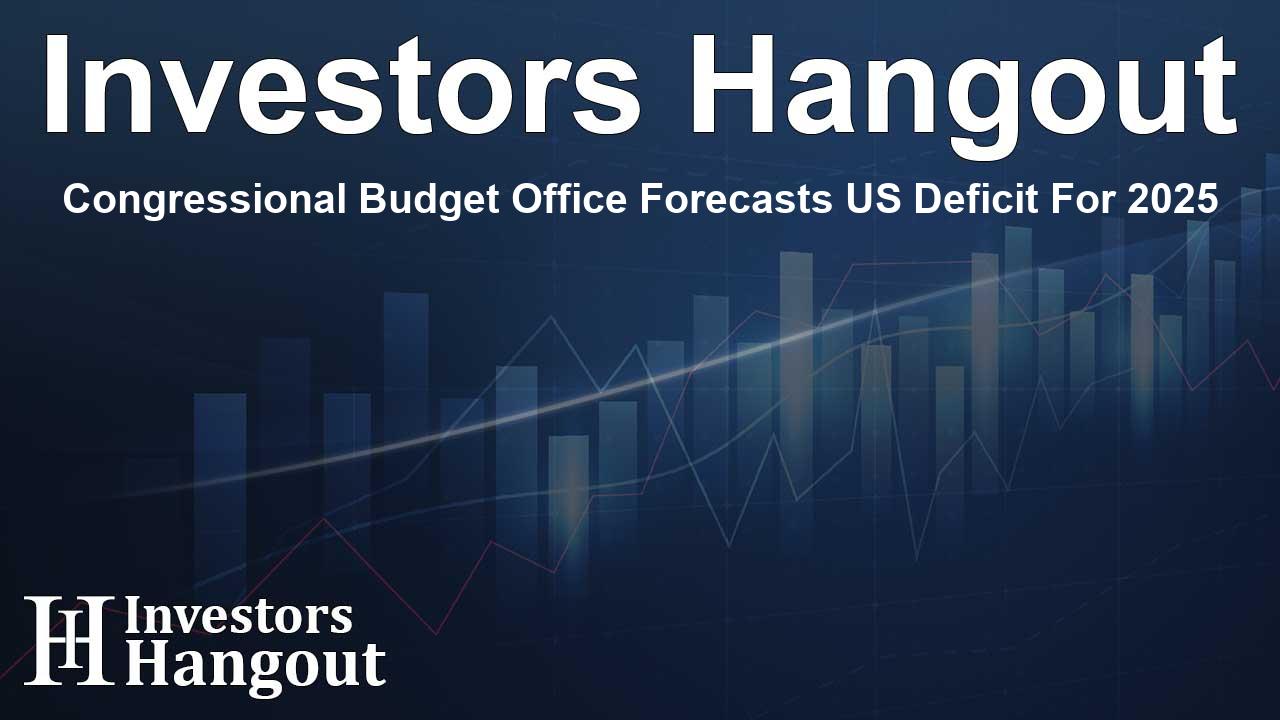Congressional Budget Office Forecasts US Deficit For 2025

CBO Updates US Deficit Projections for 2025
The Congressional Budget Office (CBO) has revealed its forecast for the U.S. budget deficit in fiscal 2025, estimating it to be approximately $1.865 trillion. This figure remains largely unchanged from the previous year's estimates, indicating a level of stability in government finances at this time.
Understanding the CBO's Baseline Estimates
The CBO's baseline estimates are derived from current laws that assume the expiration of President Trump's individual tax cuts by the end of the year. This expectation comes as Trump prepares to take office, with discussions already underway regarding potential tax reform.
Any moves by Trump and the Republican majority to extend existing individual tax rates may substantially increase deficits over the next decade unless balanced with cuts elsewhere. Furthermore, proposed changes, such as exempting Social Security and certain income types from taxation, could exacerbate the national debt.
Long-Term Deficit Trends
According to the estimates, the deficit is projected to slightly decrease to $1.687 trillion, representing 5.2% of GDP by fiscal 2027. Nevertheless, this trend of decline is anticipated to reverse, with projections suggesting a rise to $2.637 trillion, or 6.5% of GDP, by 2033. Over the 2026-2035 period, the cumulative deficit could reach around $21.758 trillion, equaling 5.8% of GDP.
Assessing the Current Economic Climate
The current CBO forecast for the 2025 deficit reflects a drop of about $73 billion from earlier predictions issued in June. Phillip Swagel, the CBO Director, attributed this slight improvement to an upward revision in revenue projections based on a robust forecast for the U.S. economy.
Swagel explained that despite similar growth projections, the overall size of the economy's benchmark has increased, leading to higher expected revenues. However, the anticipated growth rate for 2025 is now pegged at 1.9%, a slight decline from previous estimates of 2.0%.
Implications of Tax Policy Changes
As Trump prepares to take office, voices from his team warn of the severe implications of allowing tax cuts to expire. Scott Bessent, nominated to lead the U.S. Treasury, cautioned that failure to extend these tax cuts could trigger significant tax hikes, which he described as detrimental to economic growth.
Despite these warnings, the CBO’s analysis does not foresee an abrupt downturn in economic output. The projection indicates a tempered growth rate of 1.9% for 2025 compared to an estimated increase of 2.3% in 2024. This steady trajectory is expected to continue with average growth of around 1.9% through the following decade.
Federal Reserve's Role in Economic Stability
Swagel noted that the constancy of this growth outlook presupposes that the Federal Reserve will likely intervene to support the economy through easing monetary policy, thereby mitigating the impact of tax increases on consumer spending.
The CBO acknowledges that individuals and businesses may not react immediately to the forthcoming tax adjustments, allowing a transitional phase for them to adapt over the coming years.
A Look at Clean Energy Subsidies
The CBO's new forecasts also factor in an increased cost estimate for clean energy tax subsidies, expected to total around $825 billion over the next decade. This figure is markedly higher than previous estimates, reflecting adjustments made since the Inflation Reduction Act was originally passed.
As these clean energy initiatives face scrutiny from Republican leaders, there are growing concerns regarding the expansive cost of tax deductions linked to electric vehicles and renewable energy production, which could drastically influence future budget planning.
Conclusion
In summary, the CBO's projections for a $1.865 trillion deficit in 2025 underscore a critical juncture in U.S. fiscal policy as the administration transitions. As discussions about tax reforms unfold, the interplay between government revenue and spending will undoubtedly shape the future economic landscape.
Frequently Asked Questions
What is the projected US deficit for 2025 according to the CBO?
The CBO estimates the U.S. budget deficit to be approximately $1.865 trillion for fiscal 2025.
How might Trump's tax policies affect the deficit?
Efforts to extend current tax cuts could potentially add over $4 trillion to the national deficit over the next decade if not offset by other budgetary savings.
What are clean energy tax subsidies expected to cost over the next decade?
The CBO now estimates the cost for clean energy tax subsidies to be about $825 billion over the next decade.
What growth rate does the CBO forecast for the U.S. economy in 2025?
The CBO projects a growth rate of 1.9% for the U.S. economy in 2025.
Will there be an immediate drop in U.S. economic output?
The CBO forecasts do not show an immediate drop-off in U.S. output, indicating a gradual adjustment period for the economy.
About The Author
Contact Addison Perry privately here. Or send an email with ATTN: Addison Perry as the subject to contact@investorshangout.com.
About Investors Hangout
Investors Hangout is a leading online stock forum for financial discussion and learning, offering a wide range of free tools and resources. It draws in traders of all levels, who exchange market knowledge, investigate trading tactics, and keep an eye on industry developments in real time. Featuring financial articles, stock message boards, quotes, charts, company profiles, and live news updates. Through cooperative learning and a wealth of informational resources, it helps users from novices creating their first portfolios to experts honing their techniques. Join Investors Hangout today: https://investorshangout.com/
The content of this article is based on factual, publicly available information and does not represent legal, financial, or investment advice. Investors Hangout does not offer financial advice, and the author is not a licensed financial advisor. Consult a qualified advisor before making any financial or investment decisions based on this article. This article should not be considered advice to purchase, sell, or hold any securities or other investments. If any of the material provided here is inaccurate, please contact us for corrections.
